- Home
- Technical Cooperation Projects
- Index of Countries
- Africa
- Kenya
- Project for Strengthening Community Health Strategy
- Project News
- Habari ! (Hello ! in Swahili Language)
Project News
2012-06-26
Habari ! (Hello ! in Swahili Language)
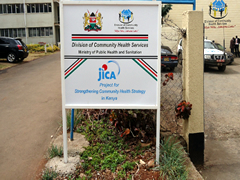
We would like to introduce our project called "Project for strengthening Community Health Strategy in Kenya" (JICA CHS Project) which began in October 2011.
What is Community Health Strategy in Kenya?
The Community Health Strategy (CHS) which was launched in June 2006 as one of the main strategies to carry out National Health Sector Strategic Plan II as a bottom-up approach to ensure that Kenyan communities have the capacity and motivation to take up their essential role in health care delivery, focusing on improving the people's own health status through primary health services at the community level.
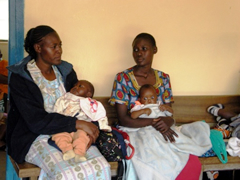
Kenya is currently faced with myriad problems anchored on the health systems (health financing, health leadership, health products and technologies, health information, health workforce, service delivery and health infrastructures). The health systems have not been responsive, acceptable, relevant, affordable, accessible and equitable in providing quality care to all, particularly people in the rural areas and urban slums. In addition, although people have been gaining knowledge about prevention from diseases or being in good health through the continuous national efforts on health education and campaigns, the knowledge has not translated to positive social behaviour change due to social and cultural reasons. For example, despite the recommendation on antenatal care and delivery at health facility, 488 maternal deaths occurred per 100,000 delivered women in 2008. (In case of Japan, only 2 maternal deaths occurred per 100,000 delivered women.)
To change this situation, Community Health Strategy was introduced by the Ministry of Health as an approach to institute community volunteers (Community Health Workers) and governing body Community Health Committee to link health facilities and community. The approach is trying to establish the mechanism that community members improve or maintain their health status through health prevention and promotion of primary health services.
The Project approach: Capacity Development
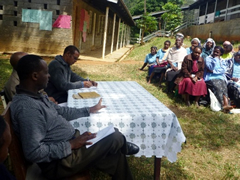
The Project approach is capacity building of counterparts' (Division of Community Health Services) as policy makers to formulate, review and revise the effective guidelines or action plans for CHS implementation. However, it is not easy for those officials who work far from the community to formulate the policies for the community addressing their real needs. It is important for the policy makers to pursue their work with a constant reminder on the questions such as whether the policies developed at the national level really address the needs of the community, are they based on the evidence, or can they be implemented appropriately at the community etc.
In brief, the Project aims to strengthen the capacity of counterparts on the understanding of the community through various activities so that after the completion of the Project, they are able to identify the challenges and problems and find the solution themselves. It will ensure that the CHS is implemented in an appropriate manner under their leadership.
Team building for the Project team and the Government Counterparts
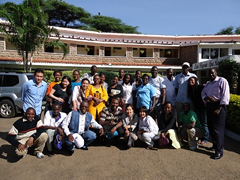
In order to make a good start for the three-year Project, it started off with a team-building exercise between our counterparts and the Project members. As a part of the team building activities, An Orientation Workshop was conducted (see attached photos). At the Workshop, varieties of team building exercises, such as "Tug of War", were done, as well as the introduction of the Project. In addition, capacity assessment for the counterparts was conducted in order to identify "Required Capacity" and "Capacity that needs to be strengthened". The result of the assessment suggested that "Checking Capacity", such as the mechanism to make the best use of experiences and lessons learned from the community for shaping policies, need to be strengthened. In other words, our counterparts working at the policy level need to be more closely in touch with the community with better understanding on what is really happening in different communities in the country. The assessment results were shared with all the participants at the workshop, and the Project team and the counterparts committed to make continuous effort to strengthen the capacity.
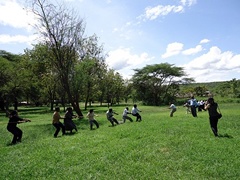
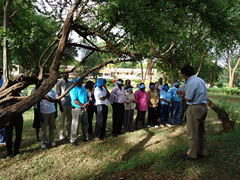
In addition to the Orientation Workshop, the Project team has been continuously trying to build a team spirit with the counterparts. It is not so easy to make a good team work among members with different backgrounds, different cultures, and different ways of thinking. Yet in order to overcome this difficulty, the Project team and the counterparts have been making constant efforts to have an unitary spirit as one team even through day to day activities and "social events" such as planning for Birthday parties regularly, making staff uniform, and having joint staff meetings have greatly improved the working relationships!
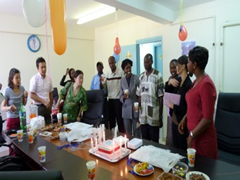
The Project is now reaching to the implementation stage after the initial stage, so more activities will be carried out from now in next three years. So, we hope to share more community health activities next time.
Asante Sana! (Thank you!)

- About JICA
- News & Features
- Countries & Regions
- Our Work
- Thematic Issues
- Types of Assistance
- Partnerships with Other Development Partners
- Climate Change / Environmental and Social Considerations
- Evaluations
- Compliance and Anti-corruption
- Science and Technology Cooperation on Global Issues
- Research
- JICA Development Studies Program / JICA Chair
- Support for the Acceptance of Foreign HRs / Multicultural and Inclusive Community
- Publications
- Investor Relations
